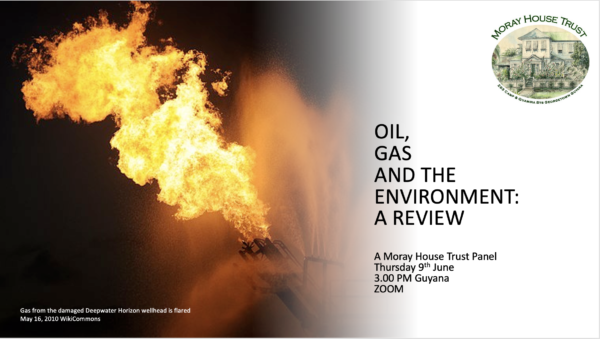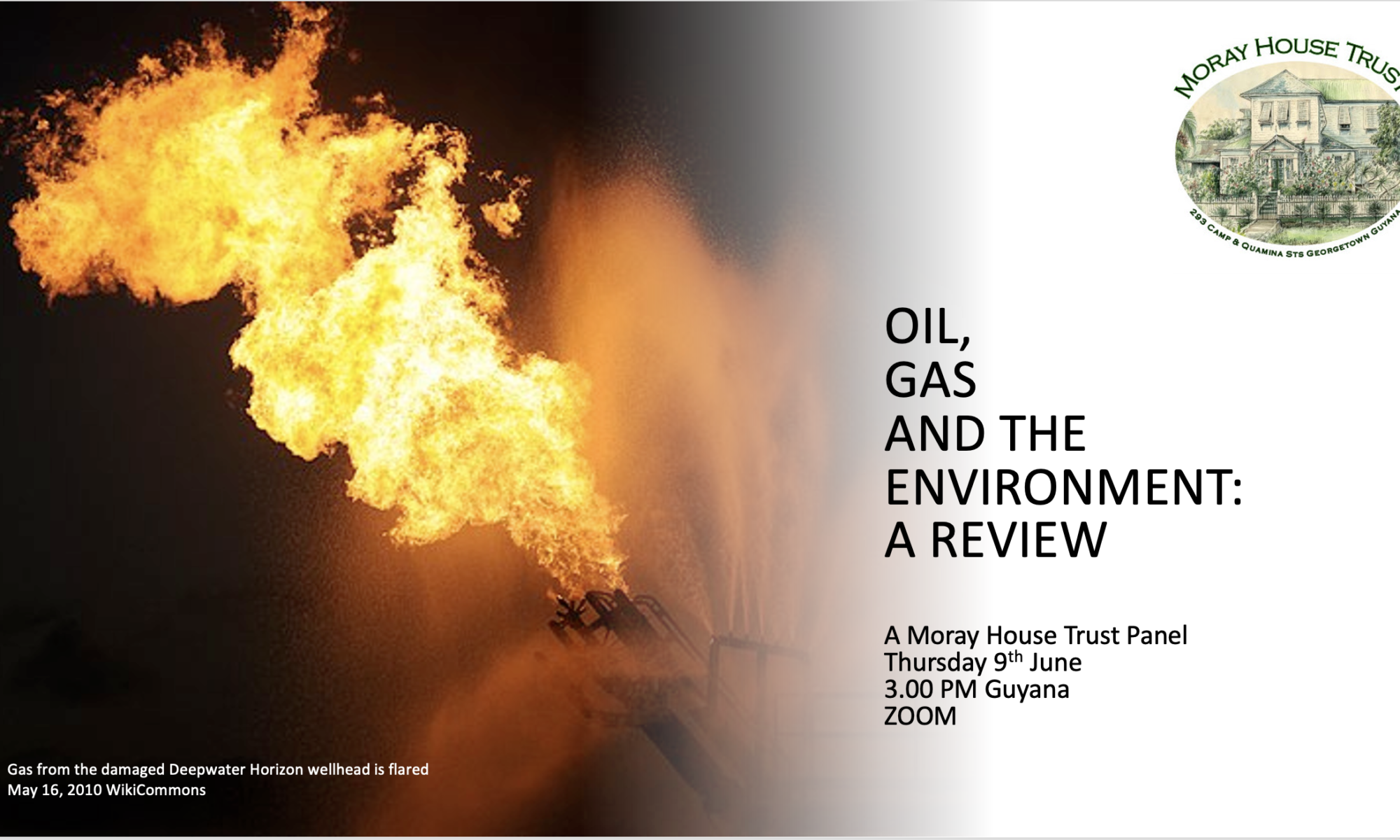Event: Panel and discussion
Host: Moray House Trust
Date: Thursday 9th June 2022
Time: 3.00PM Guyana
Participants: Dr Vincent Adams, Melinda Janki
YouTube: https://youtu.be/w0E2jjoVd1c

Title: Oil, Gas and the Environment: a review
Speakers: Dr Vincent Adams, Frances Carryl (EPA) and Melinda Janki
Date: Thursday 9th June 2022
The extraction of oil and gas offshore poses multiple threats to the
environment. The construction, operation and maintenance of a gas
pipeline also poses significant challenges. For several years, Guyana
has conducted a delicate balancing act between its role as an oil
producer and its role as a sometime pioneer of Low Carbon Development
and now a purveyor of carbon credits. Maintaining equilibrium between
these roles is a challenge, even for vastly more experienced O&G
producers. Equilibrium hinges on many factors: a robust legal
framework (to protect the environment); a network of regulatory
institutions (to implement the laws and monitor operations);
transparent and rigorous systems of appraisal; a wealth of data in the
public domain; widespread public awareness of and trust in all of the
foregoing.
This panel included Dr Vincent Adams and Melinda Janki.
Elizabeth Deane-Hughes served as the moderator with assistance from
Vidyaratha Kissoon.
THE INTRO:
Welcome to this afternoon’s panel: Oil, Gas and the Environment: a review. The panel will consist of Dr Vincent Adams and Melinda Janki. We invited a representative from the Environment Protection Agency to be part of the panel. They accepted and then withdrew at the last minute. We subsequently invited Exxon Mobil to field a representative on the panel, explaining that a public agency had withdrawn and that we hoped to offer a cross-section of views. ExxonMobil declined, citing prior commitments.
For those joining us for the first time, Moray House Trust is a private, non-partisan, non-profit based in Georgetown and dedicated to promoting Guyanese culture and public discourse. [..] Moray House Trust was founded on the ethos that a culture thrives and develops where ideas circulate and are robustly debated and interrogated. Over the past ten years, we have convened panels to discuss everything from the state of West Indies cricket to constitutional reform.
This panel is bookended by two other events in the Moray House Trust programme – one to commemorate the birth of Guyana’s greatest poet and the other to mark the untimely death of the ground-breaking historian Dr Walter Rodney in 1980. Both men, the poet and the historian, had a political conscience. Both realised that democracy is inseparable from a vibrant public discourse, it simply cannot function without it. Both tried – in poems, editorials, political speeches and books and Walter’s Groundings – to ingrain this notion in the psyche of their people. It was a key part of their praxis.
After Walter was killed on Friday June 13th 1980, Martin wrote a poem, ‘For Walter Rodney’:
It begins with these lines:
Assassins of conversation
They bury the voice
They assassinate….
The ability to converse, to speak frankly and openly was one of the casualties of the Burnham era. There were consequences to expressing one’s opinion in public – consequences ranging from lengthy tax investigations to the loss of your job if you were employed in the public sector or a beating at a political meeting. Some paid with their lives. After a while, a collective self-edit mechanism kicked in. Conversation in the public sphere, quite literally, died and with it, a cornerstone of democracy. Half a century later, the shadow of this history hangs over us and once again, there appears to be a retreat from the public sphere by, for example, our public officials.
On a separate note, if either Martin Carter or Dr Rodney were still here, they might observe, with some dismay, that over half a century after this former colony emerged from the embrace of Mother England, our economy is still wedded to the export of primary commodities: oil has simply been added to the list of gold, bauxite, logs, rice and formerly sugar. The recent announcement of a deal to export raw manganese to China and the possibility of several new gold large scale gold mines suggests that this pattern is not about to change.
Here is the crux of the matter: how do our political leaders view their role and their remit? Do they see themselves primarily as brokers of our oil, gas, gold and minerals or custodians of our environment – our rivers, our pristine forests, our savannahs, our ecosystems?
Are they put in post primarily to sell or to safeguard?
Are they primarily salesmen or stewards?
Before the advent of oil, Guyana sought to position itself on a corner of the world stage as a preserver of rainforest, a prime eco-tourist destination and a pioneer in low carbon development. Iwokrama and the Low Carbon Development Strategy are both legacies, albeit from different political dispensations, that flow from this endeavour as is the more recent tilt to marketing carbon credits.
A duality has long existed in our policies – some might call it a Jeckyl and Hyde approach. At the same time as we were earning plaudits for Iwokrama and later the LCDS, we were enthusiastically welcoming large-scale logging and gold-mining operations such as Barama and Omai with few conditions and precious little oversight. We continue to permit our own miners to foul our rivers with dredging and mercury wherever gold is to be found. The fallout from the logging and mining has been borne overwhelmingly by those far away from the centres of power and patronage. Landscapes degraded by loggers and rivers polluted by dredges and mercury are beyond the public gaze, and therefore out of mind. Only occasionally do we take note as, for example, when the collapse of a tailings dam at Omai occasioned the release of millions of gallons of cyanide-laced toxic waste into the Essequibo river in August 1995. A more recent spill when a reservoir collapsed at the manganese holdings in Port Kaituma in September 2021, barely seemed to raise eyebrows. Our politicians are amnesiac and our people suffer from a collective dose of Attention Deficit Disorder when it comes to these events.
We had all better sit up and take notice. The arrival of oil and gas, and now the construction of an undersea gas pipeline has raised the stakes dramatically. We are dazzled by the possibilities of oil revenues. We are not focussed on the risk. There are the cumulative effects of sustained and prolific offshore drilling and there is the exponential risk of a blowout, a malfunction, an oil spill, a gas leak. Without proper protections and oversight, we are moving from a game of poker to one of Russian Roulette. Our nation, our economy, indeed the Caribbean region will not recover from a major oil spill.
Other nations, such as Norway, have straddled twin roles as an oil producer and a role at the forefront of environmental protection and conservation with some success. But this is a delicate balancing act resting on sturdy foundations built up over time. They include: a robust legal framework (to protect the environment),a network of regulatory institutions (to implement the laws and monitor operations),transparent and rigorous systems of appraisala wealth of data in the public domainwidespread public awareness of and trust in all of the foregoing.
In much of this, there is a wearying sense of deja-vu. Five years ago, at an earlier Moray House Trust panel, Melinda Janki pointed out that we were relying on antiquated databases of our marine stocks in the environmental assessments conducted prior to drilling – where such databases existed at all. We still don’t have the data. We still have not compiled the inventories. Now that the deep sea drilling has started in earnest, absent the data, no-one can conclusively answer the question, where have all of the fish gone? No-one can explain to the thousands of Guyanese engaged in artisanal fishing – sometimes for generations – what has happened to their livelihoods. And as others have pointed out, occasional handouts from the state are no substitute for a loss of livelihood.
A few years ago, on another panel, a representative of an indigenous people’s organisation raised the issue of Free, Prior and Informed Consent when it comes to large-scale projects and initiatives. She pointed out that consultation seemed to be treated as simply a sharing of information, rather than a sharing of views. These impressions persist. In February 2016 we hosted a panel to discuss the closure of Wales estate. Cane farmers, sugar workers and former Chairs of Guysuco shared a microphone. It was, by some measure, the most stimulating discussion that the Trust has hosted.
LINKS FROM THE ZOOM CHAT:
https://www.commondreams.org/news/2022/06/09/terrifying-explosion-texas-gas-plant-spotlights-threat-lng-industry

